Comodo Review: Quick Expert Summary
Comodo is an antivirus for Windows that comes with lots of features — but unfortunately, it’s not very good. It has a powerful firewall and a good virtual desktop tool, but the rest of its features (including the virus scanner and phishing protection) are disappointing.
Comodo comes with:
- Real-time malware protection.
- Secure firewall.
- Anti-phishing protection.
- Virtual desktop.
- Secure browser.
- Ad blocker.
- Geek Buddy (24/7 tech support, paid plan only).
Comodo’s additional features are almost uniformly terrible. The phishing protection failed to block known phishing websites, the secure browser isn’t very secure, and the ad blocker didn’t block any ads. Worse still, the cloud backup and VPN that Comodo advertises are no longer available — they haven’t received any significant upgrades since 2021. The core malware database is the only feature that receives regular updates.
All that said, I did like Comodo’s firewall, which provides excellent protection and numerous advanced customization options. The virtual desktop is also a decent feature — it allows you to create a secure environment in which to safely run suspicious applications. But so many competitors, including Webroot, also have features similar to this.
One plus point is that most of Comodo’s features are included in the free plan despite Comodo listing the vast majority of its features as being on the paid plan only. Right now, all you get by upgrading to Comodo’s paid plan is Geek Buddy (24/7 product and tech support) and a vague virus warranty. Depending on where you look, the discontinued cloud-backup feature and VPN are also still advertised as part of the upgraded paid plan, but they no longer exist — it’s actually pretty insulting that Comodo is still trying to charge for these features.
On a similar note, Comodo’s site states that it supports Mac and Linux, but these products have been discontinued — they just haven’t bothered (yet again) to update their website. On top of all of this, Comodo has no official Windows 11 version. That said, they are actively working on a new version that’s expected to be released at some point this year.
Honestly, I struggle to recommend Comodo right now — there are just too many things wrong with it. There are much better free options out there, and if you’re in the market for the best antivirus protection, you should check out our list of the top 10 antiviruses in 2025.
| 🏅 Overall Rank | #51 out of 71 antiviruses |
| 🔥 Firewall | ✅ |
| 🌐 VPN | ✅ (Discontinued on Windows but available on Android) |
| 🎁 Free Plan | ✅ |
| 💵 Pricing | $29.99 / year |
| 💰 Money-Back Guarantee | 30 days |
| 💻 Operating Systems | Windows, Android, iOS |
Comodo Full Review — Some Good Features, but Competitors Are Much Better
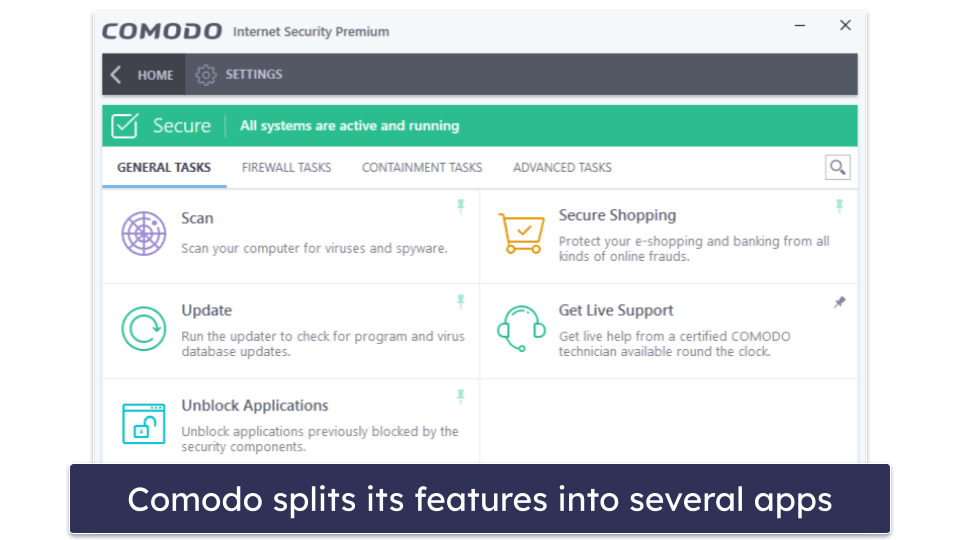
Comodo doesn’t detect malware as effectively as top antivirus competitors like Norton, but it has a good firewall and virtual desktop.
Comodo’s other features aren’t any good, though. Since Comodo hasn’t had a decent update since 2021, the anti-phishing, secure browser, and ad blocker all underperform.
Also, Comodo used to offer a VPN and cloud storage on its paid plan, but these have been discontinued, leaving only 24/7 tech support and a virus-guarantee as its paid-for features — making Comodo’s paid plans one of the worst-value offers on the market.
Although all of Comodo’s core security features are free, you’re better off looking at other options if you want decent protection. Avira is our top free antivirus in 2025, and Norton is our top pick for a full-featured paid internet security suite.
Comodo Plans & Pricing — Most Features Are Free (+30-Day Money-Back Guarantee on Paid Plans)
Comodo essentially has two plans: a free one and a paid one. However, Comodo’s website advertises a range of differently named plans, most of which don’t exist any longer, and it doesn’t accurately list what’s included in any of the plans — so things can get pretty confusing.
Comodo seem to be trying to clear up this confusion by advertising products like Antivirus for Windows 10, Antivirus for Windows 8, and Antivirus for Windows 7. Yet, if you try to buy these products, you’re always taken to Comodo Internet Security Pro (no matter which one you click on). These advertisements seem to have a more accurate list of features than older Comodo pages, however, it really isn’t difficult to find the pages with inaccurate and outdated information.
Despite what the website says, the free plan includes pretty much all of Comodo’s features. The paid plan (Internet Security Pro) costs $29.99 / year for 1 PC, or you can upgrade to cover up to 3 devices. It also comes with a 30-day money-back guarantee. However, it really isn’t worth upgrading to.
Comodo then has a separate mobile package, Comodo Mobile Security, which is also available as either a free or paid version. However, the mobile and desktop packages are completely separate from one another.
Here’s a quick overview of all of Comodo’s plans:
| Comodo Internet Security Premium | Comodo Internet Security Pro | Comodo Mobile Security | |
| Platforms | Windows 7/8/10, Android, iOS | Windows, Android, iOS | Android, iOS |
| Price | Free | $29.99 / year | Free (with paid add-ons) |
| Number of device licenses | 1 | 1-3 | 1 |
| Malware scanning & removal | ✅ | ✅ | ✅ |
| Real-time protection | ✅ | ✅ | ✅ |
| Firewall | ✅ | ✅ | ✅ |
| Secure Shopping | ✅ | ✅ | ❌ |
| Web filtering | ✅ | ✅ | ✅ |
| Virtual Machine | ✅ | ✅ | ❌ |
| VPN | ❌ | ❌ (despite advertising one) |
✅ (paid upgrade) |
| 24/7 customer support | ❌ | ✅ | ❌ |
| $500 virus guarantee | ❌ | ✅ | ❌ |
Comodo Free Antivirus — Free Plan for Windows
Comodo’s free software comes with all of its main features, including:
- Malware scanner.
- Real-time protection.
- Secure firewall.
- Anti-phishing protection/website filtering.
- Virtual desktop.
- Secure shopping (secure browser).
- Ad blocker.
- Gaming mode.
Given it’s free, it’s not a terrible option. The firewall is excellent, the virtual desktop and sandbox feature work well, and the malware scanner and real-time protection work well enough to at least make this a better option than no protection at all. But frankly, I’d recommend Bitdefender’s free antivirus software instead — it has a number of features that are much better than Comodo’s, including a scanner with a 100% malware-detection rate.
Comodo Internet Security Pro — Not Worth the Upgrade
Comodo Internet Security Pro is (currently, at least) the only paid plan actually available for purchase and download. Keep in mind that there are no official versions available for Windows 11 at the moment.
Comodo’s paid plan includes the free Comodo Internet Security Premium software and additionally comes with:
- Geek Buddy (24/7 tech and product support).
- A $500 virus-free guarantee.
So with this package, you are effectively just paying for an additional help service and a guarantee — there are no additional features in the software or even a different software to download. It’s the exact same software as the free plan.
Geek Buddy gives you 24/7 access to a remote support team. These engineers can take control of your PC in order to help you use the Comodo software and run a “personalized malware cleaning service”. Norton offers the same feature with its plans, but Norton’s support team will also help optimize your PC (and Norton’s plans are also full of useful extras that work really well, unlike Comodo’s).
The virus-free guarantee covers you for up to $500 worth of virus damage if your PC becomes infected while Comodo’s antivirus software is installed. Personally, I find this a very odd “paid” extra feature, and it only makes me question the reliability of Comodo’s free anti-malware protection. However, given that a bad malware infection can have costs that spiral into the thousands of dollars, this is clearly not worth paying the extra for anyway.
Basically, all of Comodo’s paid features are pretty worthless, so you should just avoid paying for Comodo in 2025.
Comodo Internet Security Complete — Discontinued Plan (But Still Promoted)
Comodo Internet Security Complete is no longer available for purchase, but this is the plan most prominently advertised on Comodo’s web pages. If you try to buy it, you’re just redirected to Comodo Internet Security Pro.
The details presented on Comodo’s home page (amongst others) suggest that the free plan includes far fewer features than it actually does, and encourages you to upgrade to Internet Security Complete in order to benefit from features such as the firewall and secure shopping — which are in fact included in the free plan — plus the following additional features:
- Unlimited product support (elsewhere called the Geek Buddy service).
- $500 virus-free guarantee.
- 50 GB cloud storage space.
- TrustConnect VPN with 10 GB data.
As already mentioned, the VPN and cloud storage have been discontinued since 2012, so these are long gone. However, that aside, you’ll soon realize that Internet Security Complete isn’t actually available for purchase anywhere anyway.
It really annoys me that Comodo’s website is so out of date, confusing, and misleading. To be promoting completely incorrect features and plans on their most prominent web pages is a big no-no for me. If you want a decent antivirus that comes with a VPN and cloud storage, I’d suggest Norton 360.
Comodo Mobile Security — Free Plan with Paid Add-Ons
Comodo’s mobile software, Comodo Mobile Security, is available for both iOS and Android, although the iOS version is very limited. The software is free to download and comes with a number of free-to-use features. You can then upgrade to a premium version directly from your mobile device for a VPN. Like other plans, the mobile plans are a bit misleading, while it says that Safe Browsing and Secure Vault is only available with the upgrade, I had no problems setting it up and using it.
Comodo Mobile Security for Android includes:
- Virus scanner.
- Safe Browsing (web protection).
- ID protection.
- App lock.
- Wi-Fi security.
- Firewall.
- VPN with unlimited data. (Upgraded plan)
- Secure Vault.
Unfortunately, most of the free features don’t work particularly well, so while the paid-for features aren’t bad, they’re not really worth the cost on their own. Most top antiviruses, such as Norton and TotalAV, have excellent mobile support that come as part of their full packages — meaning you can protect all of your devices with one subscription and for a better overall value.
Comodo Security Features — Excellent Firewall & Virtual Desktop (Ok Malware Scanner)
Malware Scanner — Multiple Scan Options, but Only Ok Results
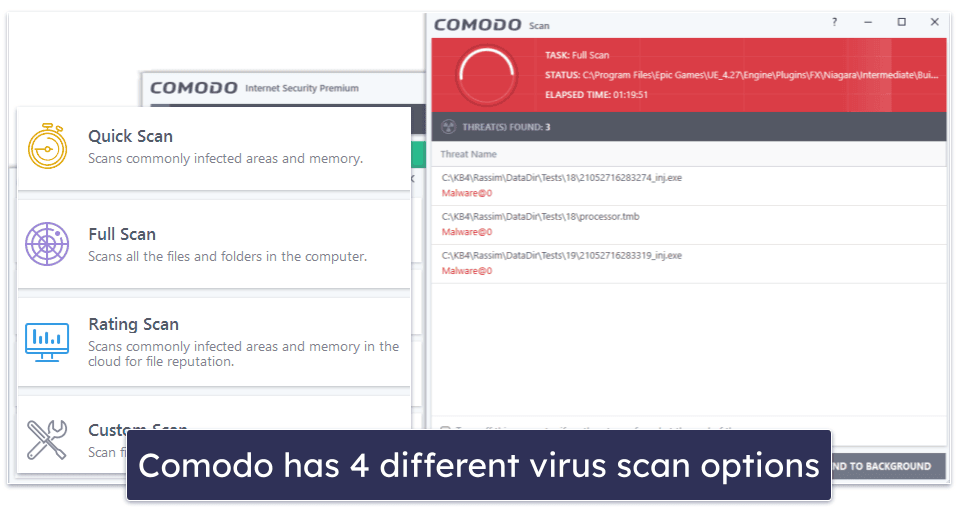
Comodo’s malware scanner is only okay — especially when compared to the competition. While it isn’t the worst malware scanner I’ve ever seen, since its database at least sees regular updates, it is worse than all those on our list of the top 10 antiviruses.
Comodo has 4 scan options:
- Quick scan. Scans system memory and commonly infected areas for malware threats.
- Full scan. Scans your entire PC and removable devices for malware threats.
- Rating scan. Uses Comodo’s cloud database to give files a trust rating.
- Custom scan. Allows you to select which files or folders to scan.
I installed a repository of malware samples on my test PC before individually running all 4 scanners. The Quick Scan only took 3 minutes to complete, but I was disappointed with the results — it missed malware samples that competitors like Norton had detected in their quick scans. (Norton and other competitors like McAfee and Bitdefender regularly detect 100% of malware samples in our testing).
The results were better when I ran the Full Scan (which took 3 hours on my PC). This time it found 93% of malware samples, including the samples the Quick Scan had missed. But this is still a fair way off a 100% detection rate.
The Rating Scan checks your files and security certificates against Comodo’s cloud database and marks them as either trustworthy or untrustworthy — but its ratings are wildly inaccurate. The scan only took 30 seconds to complete, but it marked files I trusted with a poor rating and gave my PC an overall trust rating of 0% despite only having 8 unrecognized files.
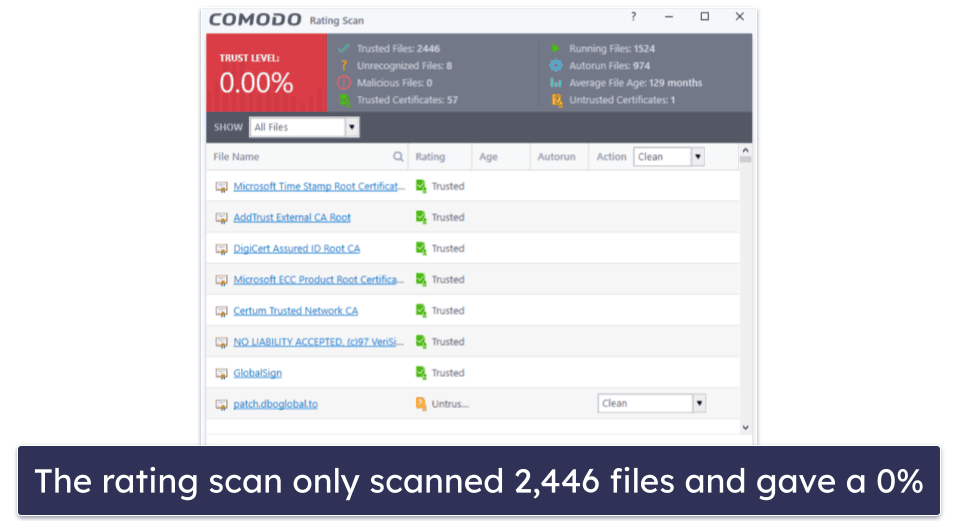
I much prefer ESET’s Running Processes feature, which works similarly but gives trust ratings to files that are actually running and likely to cause damage if they’re malicious.
The Custom Scan was the only scan option that I didn’t have any issues with. I like how Comodo allows you to scan a particular file or folder on a schedule, and it was super easy to set up the custom scans.
Overall, Comodo’s scanner isn’t the best on the market, by a long shot. You can’t fully rely on the Quick Scan, and the Full Scan’s detection rates aren’t as good as other competitors. If you want a free antivirus with a reliable scanner, you’re better off getting Bitdefender’s free package instead, which has one of the best malware scanners around.
Real-Time Malware Scanner — Catches Malware in Real-Time + Cool Host Intrusion Prevention System
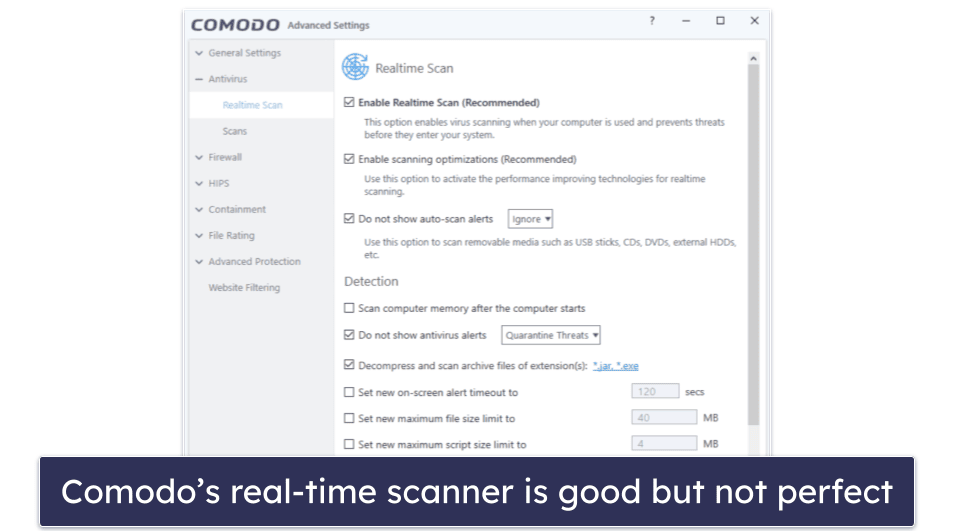
Comodo’s real-time scanner blocks malware files in real time, and it does a decent job. It also includes a host intrusion prevention system (HIPS) that stops malicious files or programs from accessing critical system folders.
I tested the real-time scanner by attempting to download a collection of nearly 1,000 malware samples. Comodo’s real-time protection blocked over 90% of these samples before I could install them. Again, this isn’t terrible, but it’s not as good as premium antivirus suites like Norton and Bitdefender, whose real-time scanners can block 100% of malware files.
Unfortunately, there aren’t many customization options for the real-time scanner — you can’t adjust scan intensity, and it’s hard to whitelist safe files. In comparison, Bitdefender is highly customizable and lets you choose which objects the scanner should defend against.
Comodo’s HIPS feature is turned off by default. Most users will be fine keeping it this way as the real-time protection is sufficient. However, advanced users will appreciate being able to use HIPS to create rulesets that prevent particular executables from running without permission.
Overall, Comodo’s real-time scanner is okay, but it’s not nearly as good as the best antivirus programs in 2025. If you’re looking for an antivirus with excellent real-time protection, Bitdefender and Norton are both better options.
Secure Firewall — One of the Best Firewalls on the Market
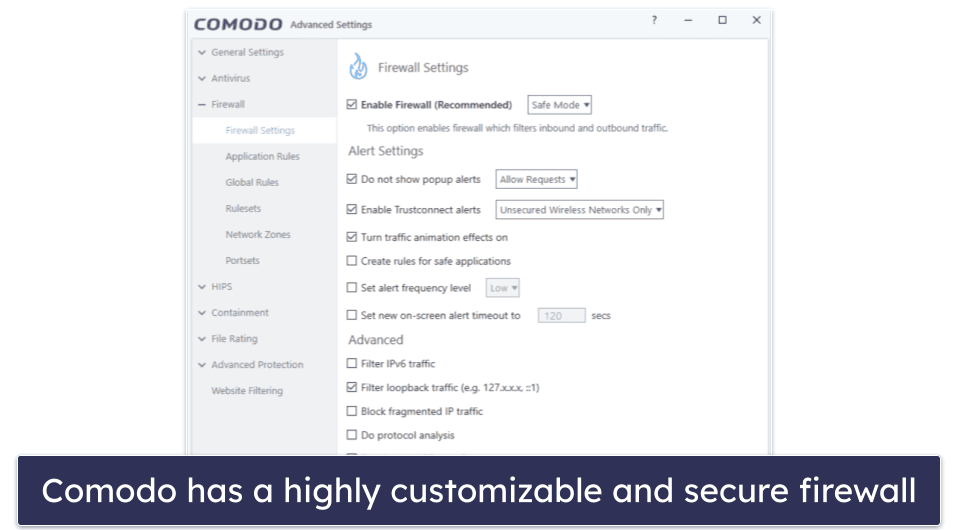
Comodo’s Secure Firewall is its best feature — it’s highly secure and has a lot of options to customize your network protections. In my tests, Comodo was able to detect a variety of network intrusions, spoofing attacks, and malware files that Windows’ built-in protections failed to block.
Comodo’s Firewall has 4 modes:
- Block All. Blocks all traffic and prevents your PC from connecting to the internet.
- Custom Ruleset. Allows you to specify rules that the firewall follows.
- Safe Mode. Automatically creates rules for traffic that Comodo recognizes and asks your permission before allowing traffic it doesn’t recognize.
- Training Mode. Uses machine learning to create custom rulesets based on your activity.
Most users will just want to stick with Safe Mode, but I really liked Comodo’s other options too.
Block All is a good choice if you have a virus on your system and want to keep your computer offline.
Custom Ruleset is good for advanced users. You can create rulesets that you can quickly apply to individual applications. For example, I made a new ruleset called “Video games”, which allows all in and out connections. I could then individually add video games to that ruleset without defining their permissions every time.
Finally, the Training Mode uses machine learning to create rules based on your activity. While this is a pretty good feature, it can be problematic if your computer has a malware infection — if the malware is running during your “training”, the firewall will remember it as a legitimate process and fail to block it. Training Mode is great for advanced users, but I wouldn’t recommend it for the average customer.
The firewall also comes with many customization options, which advanced users will appreciate. You can turn off alerts, automatically filter IPv6 and loopback traffic, block fragmented IP addresses, and enable anti-ARP spoofing. You can also easily block individual network connections, which is pretty cool.
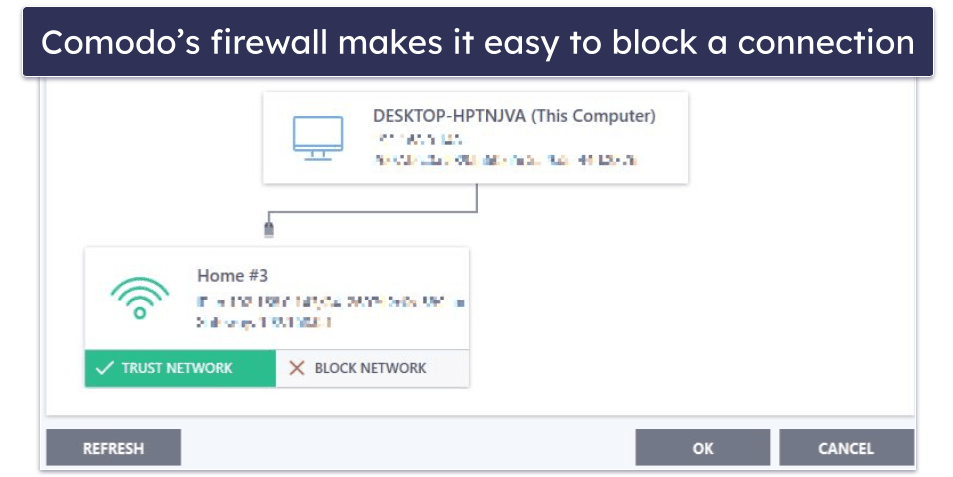
If the firewall blocks a false positive, it’s really easy to whitelist it. Pressing a button on the main user interface lists the most recently blocked applications. You can simply right-click on a trusted application and select Unblock. The firewall will then make a custom ruleset permanently allowing that application a network connection. I really like how easy this is to do — many competitor firewalls (like ESET’s) only allow you to unblock an application by digging through the settings.
Finally, Comodo’s firewall allows you to view all active connections on your device. You can block dangerous connections and easily see if any applications are using all of your bandwidth.
Overall, Comodo’s firewall is one of the best I’ve tested — it’s just as good as firewalls from premium competitors like Norton and Bitdefender.
Phishing Protection/Website Filtering — Highly Customizable Phishing Protection (But It Doesn’t Work Too Well)
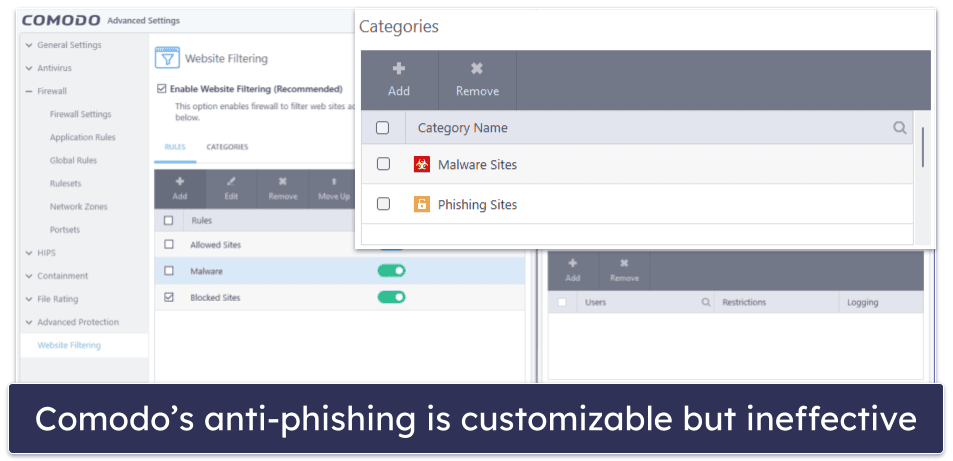
Comodo’s phishing protection didn’t perform very well in my testing. I visited hundreds of phishing sites and measured Comodo’s detection rate against Google Chrome, and Google Chrome blocked more phishing websites than Comodo. In comparison, Norton and McAfee blocked more phishing sites than Google Chrome.
The website filtering feature is also disappointing. It’s only compatible with Internet Explorer (an obsolete browser in 2025) and Mozilla Firefox. Most antiviruses, including Norton, McAfee, and Bitdefender, have web-protection tools that are compatible with all the top browsers.
Overall, Comodo’s anti-phishing feature is disappointing. It doesn’t work as well as Chrome’s default protections and lacks compatibility with most web browsers. If you’re worried about phishing attacks, you’re better off using Norton or McAfee (or even just sticking with Chrome’s default protections).
Comodo Virtual Desktop — Helpful Sandbox Environment for Advanced Users

Comodo’s Virtual Desktop is a secure sandbox environment for testing potential malware files without the risk of those files spreading throughout your device. It’s a cool feature for security professionals, but it won’t be very useful for most users.
Secure sandboxes run a simulated version of your operating system. This means a malware file thinks that it’s running on your hard drive, but it’s actually just running in a simulated environment where it can’t invade your disk or make changes to your system. iOS and ChromeOS both use sandboxing to make their devices malware-proof.
For my testing, I downloaded and installed a variety of malware samples inside the Virtual Desktop, and then closed the Virtual Desktop. The malware files were nowhere to be found anywhere on my actual PC, which proved that Comodo’s sandbox is fully secure.
Overall, Comodo’s Virtual Desktop is a well-designed security tool, but it’s definitely aimed at more advanced users. Your average everyday user only really needs a secure antivirus program, like Norton or Bitdefender, which will automatically detect and block all malware files on their system without requiring an additional testing step.
Comodo Secure Shopping (Secure Browser) — Pretty Good Protections in a Buggy App
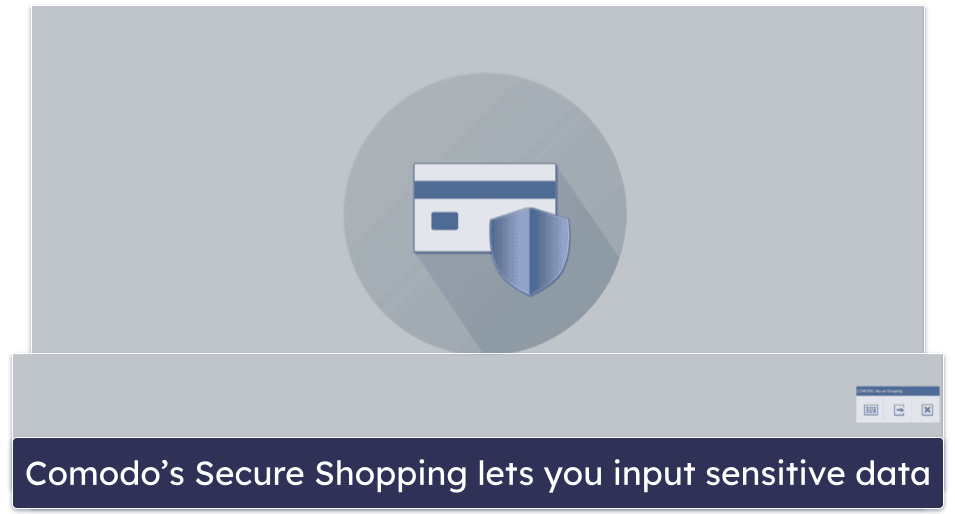
Comodo’s Secure Shopping is a decent tool for enhancing your privacy via a secure browser, but it was pretty buggy during my testing.
This feature is slightly misleading in name given that it’s not only for shopping — it’s basically a secure browser. It provides the following security features:
- Hides your sensitive data from other processes that are running on your PC.
- Blocks keyloggers from recording your keystrokes.
- Warns you if there’s a remote connection to your PC.
- Detects fake SSL certificates, in order to prevent man-in-the-middle attacks.
- Prevents any hackers or malware from being able to take screenshots of your session.
These protections are pretty good (although any antivirus with a good firewall should be able to detect remote connections, and fake SSL certificates aren’t much of a problem in 2025 because of modern internet encryption methods).
However, even with Secure Shopping activated, I found I could still screen capture my online activity. This is obviously far from ideal, as that’s one of its core features in order to protect against hackers stealing your data.
Secure Shopping is almost helpful, but it just doesn’t work quite well enough. Bitdefender’s Secure Browser is a much better feature that can successfully block screen capture, keyloggers, and unsafe connections, plus it didn’t block any of my games and apps during my testing.
Overall, Comodo’s Secure Shopping is okay, but it’s not as good as the secure browser feature from competitors like Bitdefender.
Ad Blocker — Unfortunately, It Doesn’t Work
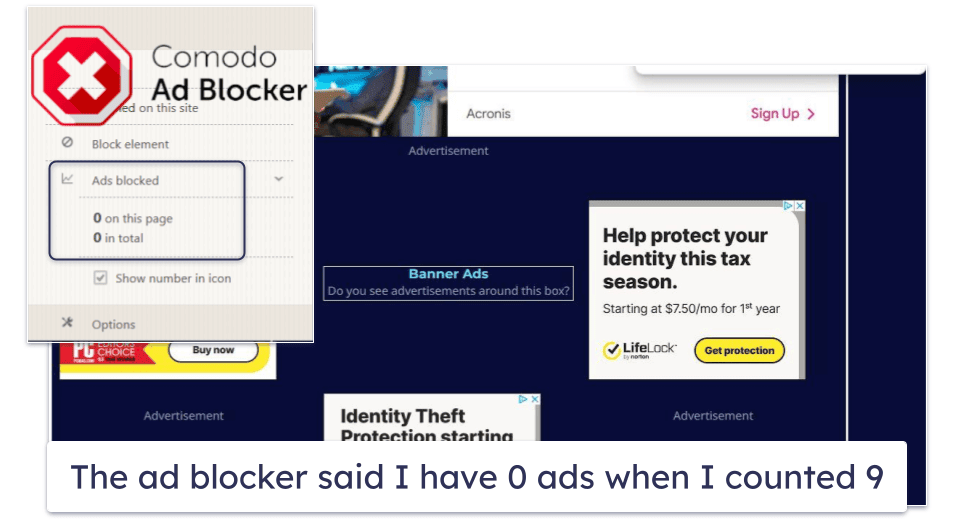
Comodo’s Ad Blocker is impressively ineffective — it literally doesn’t work at all. It’s available as a Google Chrome extension, but there are many better alternatives out there.
When I downloaded the ad blocker and restarted my browser, I could still see advertisements on the web. In fact, I was staring right at numerous pop-ups while Comodo told me there were none detected on the page.
Competing antiviruses like Avira and TotalAV both offer good ad blockers, and ProtonVPN’s ad blocker is also really good.
Additional Features — Good Range of Extras (But Some of Them Don’t Work)
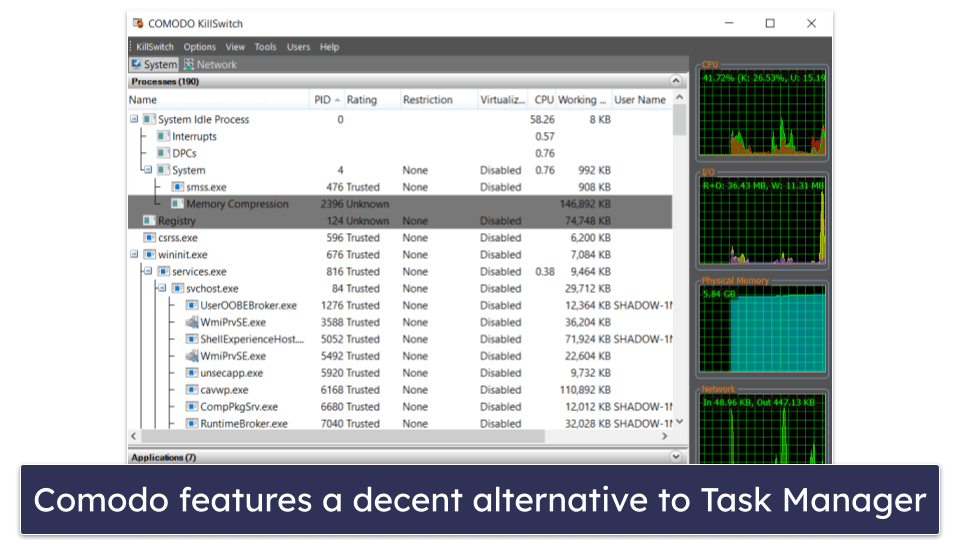
Comodo’s Internet Security plans also come with several other features. These are:
- Comodo Cleaning Essentials.
- Task Manager.
- Watch Activity/KillSwitch.
- Gaming Mode.
- Rescue Disk.
- Virus Scope.
- Cloud Backup (paid plan; doesn’t work).
- VPN (paid plan; doesn’t work).
Comodo’s Task Manager didn’t work on my system and just showed a blank screen. However, KillSwitch worked well. KillSwitch is like a more-detailed version of the Windows Task Manager, and it’s pretty good. Similar to Windows Task Manager, it allows you to end processes. However, you can also terminate network activity, see a list of programs based on how often you use them, and more.
Gaming Mode mutes Comodo’s notifications while running full-screen apps. It works well enough, but unfortunately, it doesn’t provide system optimization like Norton’s gaming mode. Comodo’s gaming mode also doesn’t turn on automatically when you enter full-screen mode, like Norton’s does.
The Cloud Backup feature theoretically allows subscribers to store up to 50 GB of data on Comodo’s cloud network — but it doesn’t work. When I went to register for the storage, I received an error. I contacted customer support, and they told me the cloud storage is undergoing maintenance. According to Comodo’s website, cloud storage is only compatible with computers running Windows 7 or older, meaning it’s been down since 2012.
And finally, Comodo advertises a VPN called TrustConnect as being part of its paid Pro plan, but again — it no longer works. Just as with the cloud storage, customer service said it’s currently under maintenance, but it actually looks to have been discontinued since 2012. I have no issue with products being discontinued, but Comodo needs to update its web pages and be more upfront with its customers.
Overall, Comodo has a lot of additional features — but the vast majority either don’t work particularly well or no longer exist at all.
Comodo Ease of Use & Setup — Straightforward & Customizable Interface
How to Install Comodo (Just 3 Simple Steps):
- Purchase Comodo. (optional). Start by heading to the official website and navigating to the Antivirus page. From there, click on the plan you want and create an account.
- Download Comodo. After buying a subscription or creating an account for the free version, click on the download link found in your email.
- Follow the instructions. From here, the installation wizard will walk you through the setup process. Simply follow the prompts to continue. In the end, you can tweak a few optional security features.
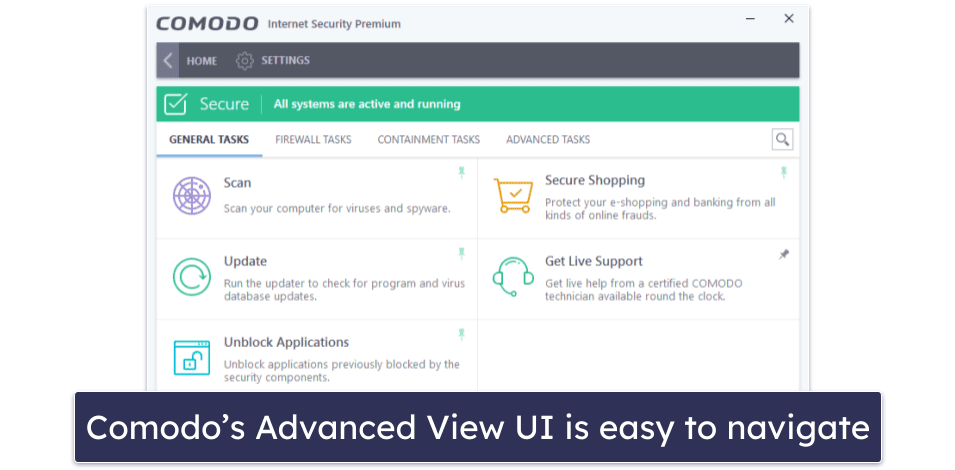
One thing that Comodo has done relatively well with is its user interface (UI) — which is nice and straightforward to navigate.
The UI comes with two views: Basic and Advanced.
Basic View allows you to scan your PC, unblock applications blocked by the firewall, update Comodo, and access Secure Shopping. It hides many of the advanced features, like the virtual desktop and firewall settings, but it’s ideal for users who want a basic experience and to not be overwhelmed by too many tools and controls.
Advanced View then allows you to access everything. You can also change the color and language of Comodo’s user interface.
Using the basic features, such as running scans and even setting up custom-scan profiles, is also really simple and intuitive. As is scheduling the scans to run regularly according to your preferred schedule.
Installing the software is easy, but you need to install 2 separate applications:
- Comodo Internet Security Premium.
- Comodo Secure Shopping.
Plus, you’ll need to install even more software or extensions if you want to access additional features, like the ad blocker. To be honest, having separate apps and extensions made Comodo feel like bloatware (especially given that most of Comodo’s additional features are ineffective and buggy). Most competitors (including Bitdefender) provide all of their features in a single user interface, which I far prefer.
Overall, Comodo is pretty easy to set up and use. It utilizes a clean UI with large buttons and various themes so you can adjust the colors to your liking, but I’d prefer it if Comodo bundled all of its tools in one helpful online dashboard, like Norton does.
Comodo Mobile App — Disappointing Mobile Apps for Android & iOS
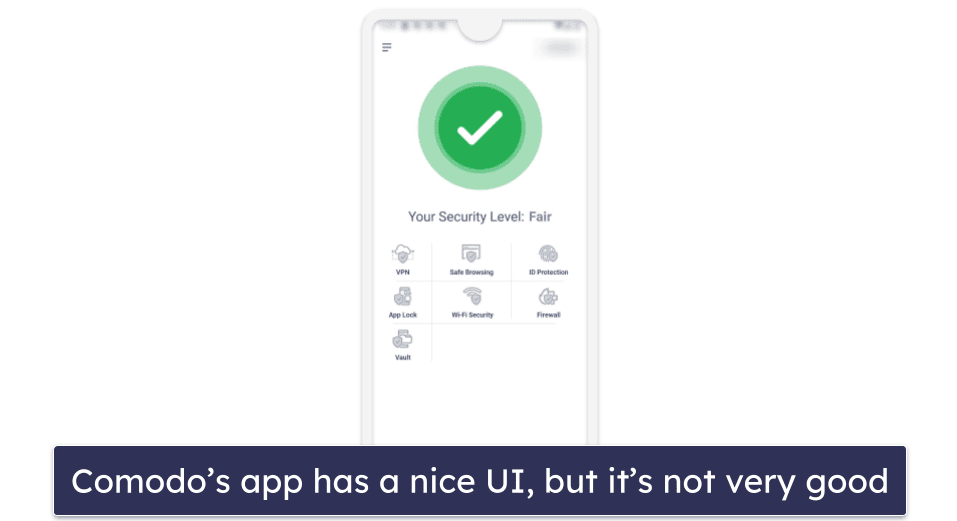
Comodo has a free mobile app that supports both Android and iOS — but it’s not very good. Comodo’s Mobile Security is also completely separate from Comodo’s desktop product and subscription, which is a little annoying.
Comodo’s Mobile Security for Android includes:
- Virus scanner.
- Safe browsing (web protection).
- ID protection.
- App lock.
- Wi-Fi security.
- Firewall.
- VPN with unlimited data. (Premium only)
- Secure vault. (Premium only)
The iOS app is considerably more limited: it only has the Safe Browsing and ID Protection features on its free plan, with the VPN and Vault (plus a more comprehensive version of ID Protection) on the paid plan.
To test the virus scanner, I hid a number of malware samples on my Android device. Comodo detected and removed 93% of them in less than 3 minutes, which is decent — but not great. By comparison, Norton’s mobile app detected 100% of the malware on my Android in my testing.
Comodo’s mobile anti-phishing tool was unfortunately just as bad as Comodo’s anti-phishing tool for desktop — it failed to block many dangerous sites and was less effective than the built-in protection from Chrome, Safari, and Firefox.
ID Protection supposedly checks a proprietary database to see if your email and credit card have been leaked in a data breach, but it doesn’t work. During testing, I used an email that has definitely been compromised, and Comodo said it wasn’t listed in any data breaches. Many competitors like Norton have highly accurate dark web monitoring tools that can give you live updates if any of your information is breached — Comodo’s ID protection does not.
App Lock lets you lock chosen apps behind a passcode, which is a basic but helpful feature for users who share mobile devices with family or just want that extra layer of security.
Wi-Fi Security scans networks for unsafe behavior — I found it was able to determine if I was logging into a network that wasn’t password protected, but that’s all. Many competitors, including Norton, have better features when it comes to mobile security. Additionally, Norton’s firewall provides tons of details about devices connected to your network.
To test the VPN and Vault features, I had to upgrade to a premium plan. This also includes an extended version of ID Protect, which allows you to monitor 20 emails and 20 credit cards — but given that it doesn’t work, that’s not anything to get excited about.
The secure vault is a pretty decent feature — it allows you to protect your files behind a passcode or biometrics, and it works.
Comodo’s mobile VPN comes with unlimited data, which is better than many free VPNs. Unfortunately it only has servers in 8 locations (which is not even close to TotalAV’s 100 locations), but that said, I was pleasantly surprised at the speeds when connected to nearby servers — I didn’t notice any slowdowns while browsing the web, and I could still stream HD video. I also checked for IP leaks and found the VPN was fully secure. However, given the other Mobile Security features are so poor, paying for this alone really isn’t worthwhile. Other antiviruses such as Bitdefender and TotalAV all have decent VPNs for mobile as well as on their desktop plans, which make them a far better value.
Overall, Comodo’s mobile app is disappointing. While it has a decent-ish malware scanner, most of its other features don’t work, or they’re just buggy and ineffective, and the paid plan really just isn’t worth the money. If you want a fully functional mobile antivirus, you should instead check out our lists of the best Android and iOS antivirus apps in 2025.
Comodo Customer Support — Decent Knowledge Base, Live Chat & Forums
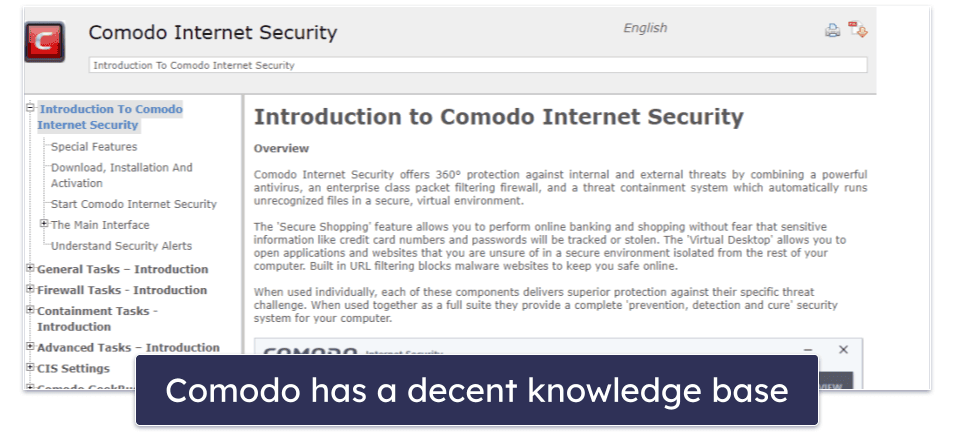
Comodo’s support options include:
- Live chat. (Windows software only)
- Email.
- Phone support. (Paid plans only)
- Knowledge base.
- Forums.
The live chat support is accessible from the main website or the antivirus UI, which is pretty handy. I connected with an agent moments after opening a ticket. They were semi-helpful — eventually — but very slow to reply to most of my questions, and I frequently had to repeat myself, which got pretty frustrating. They also couldn’t help me at all with any questions about the mobile apps, which are handled by a different team.
When I submitted an email about the Windows software, I got a confirmation moments later and a response 30 minutes after that, which is great. Some support teams (like TotalAV) can take up to 24 hours to respond via email. However, there were a lot of emails back and forth before I got useful answers to my questions, which was both time consuming and annoying.
When it comes to mobile support, it was practically non-existent. I emailed them (which had to be via a different email address), got an automated response saying they received it, but unfortunately, I never heard back from them. As a result, my questions were left unanswered.
When I tested Comodo’s phone support, I was happy with the agent’s helpful answers to my questions. Unfortunately, you can only contact their phone support if you have a premium plan. Since I don’t think Comodo is worth paying for, their phone support isn’t all that exciting.
The knowledge base is fairly helpful and gives easy-to-follow instructions on most Comodo Internet Security Premium features. The instructions use lots of screenshots and are easy to follow. They even include tutorials on more advanced tasks. However, they don’t have instructional videos like Bitdefender does, and — as per most things on Comodo’s site — there are lots of old and out-of-date articles, so finding exactly what you need can take a while.
When I posted on Comodo’s forums, I sometimes received replies in about 4 hours that were both helpful and informative. But it wasn’t always reliable, and some of my posts went without replies entirely.
Overall, Comodo’s customer support is okay but not great. You won’t get any phone support without paying for a product, and the email and live chat support, though both quick to answer, weren’t as helpful as I’d have liked. And if you have any questions about Comodo’s mobile app, I can only wish you luck.
Can Comodo Protect All of Your Devices in 2025?
In a word — no. Comodo is not a good antivirus in 2025, especially when compared to top competitors like Norton and Bitdefender.
Firstly, Comodo no longer supports macOS or Linux, and its iOS app is extremely limited, so Comodo is only really worth considering for Windows and Android users — despite Comodo’s own website suggesting otherwise.
In terms of the Windows software, I was impressed with Comodo’s excellent firewall feature, and its Virtual Desktop tool is helpful for security and malware research (although most security researchers will already have their own standalone sandbox apps).
But Comodo’s antivirus scanner isn’t as good as any of those on our top 10 antiviruses in 2025 list, its anti-phishing feature is poor, and most of its additional features are also not very good.
Comodo’s developers have also abandoned many of its other features — namely the cloud storage and VPN. None of these features work in 2025, yet are still mentioned all over its website. The ones that haven’t been outright left behind haven’t seen a significant upgrade in several years, making them fall behind modern standards. That said, Comodo do have a beta for a new version of their antivirus on their forum — but I’ll test that when it’s officially released to the public.
The customer support channels are generally good. Live chat representatives are easily reachable, although getting detailed answers might take time. The knowledge database is mostly helpful, and the user forums are active.
But overall, I really wouldn’t recommend Comodo. Its free plan is simply not as good as others available, and its paid plan is definitely not worth the money. If you want a good free antivirus, Bitdefender is the best choice, and if you’re looking for the very best protection in 2025, I’d recommend Norton.
Frequently Asked Questions
Is Comodo Antivirus good?
Honestly, no. Comodo Antivirus isn’t good. The malware scanner didn’t score well in my testing, the anti-phishing feature is weaker than Google’s default protections, and the ad blocker simply didn’t work at all. Also, many of the premium features are no longer available, even though Comodo still promotes them. It doesn’t even have an official Windows 11 version. If you want a good antivirus, you should check out our top 10 list of antiviruses in 2025).
Is Comodo Antivirus free?
Yes, Comodo Antivirus is free — but Comodo’s website doesn’t make this very clear. All of Comodo’s antivirus and internet security features are, in fact, included in the free version (called Internet Security Premium). This includes the malware scanner, firewall, secure browser, and more. Comodo also has a paid plan, Comodo Internet Secuirty Pro, but I wouldn’t recommend buying it as it only includes 24/7 tech support and a virus warranty that you’ll probably never need to use, in addition to the free software.
There are a lot of much better (and good-value) antivirus programs on the market, like Avira, which has an excellent free version and affordable plans.
Does Comodo Antivirus have a firewall?
Comodo does have a firewall, and it’s good. I thoroughly tested Comodo’s firewall and was impressed by how easy it was to use, as well as by its advanced features and customization options — which tech-savvy users will appreciate. Despite what Comodo’s website may say, the firewall is available as part of its free software package, so if you’re primarily looking for a decent and free firewall, Comodo is a good option.
However, if the firewall is just one of many features you’re interested in, you’ll be better off going for a different premium antivirus suite — like Norton — which has an equally good firewall, plus a lot of other features that are much better than Comodo’s.
Is Comodo Antivirus safe?
Comodo Antivirus isn’t unsafe in itself, but it can’t fully protect you from malware or other online threats. Comodo’s software will provide you with more protection than if you had no antivirus software at all. However, its malware scanner isn’t as effective at identifying, blocking, or removing malware as its top competitors, and the anti-phishing feature doesn’t even work as well as Chrome’s default protections. There’s also no way to protect your data on desktop PCs using a VPN — since Comodo’s VPN is no longer supported.
Given that Comodo’s antivirus software is free, it’s better than having nothing at all. But if you want to ensure your PC is completely safe from online threats, you should opt for a more secure antivirus, such as Norton or Bitdefender.






